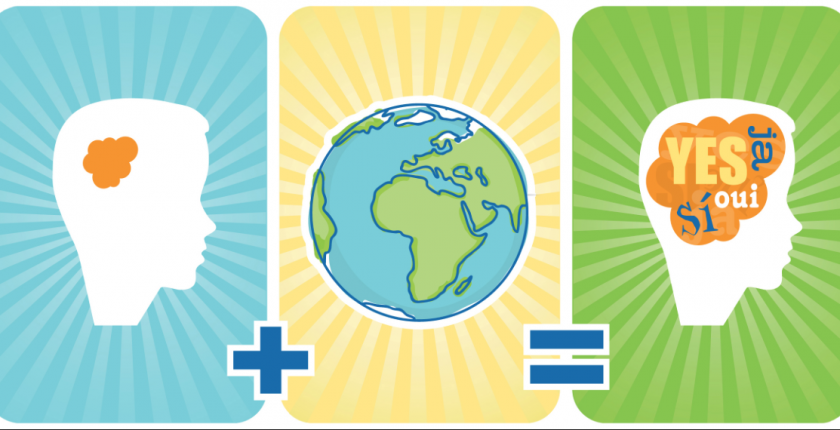From lama.hypotheses.org written by BÜNYAMIN&HAIRI&ANN-KATHRIN
How did you learn your first language? And how does it differ from how you have been learning English? Understand the difference and your grades will benefit from it.
Do you remember the day you first said ‘Mama’ and ‘Papa’? Probably not, because you were still a little baby. Somehow you started speaking naturally even though you never put effort into learning the language explicitly. Now by contrast, think about how you learn English – in school with the help of your English teacher. Do you see the difference between these two situations? From a linguistic perspective, we call the two cases language acquisition and language learning.
Before we start talking about acquisition and learning, we need to clarify some terms. There are three different language statuses:
| Mother Tongue or L1 | your native language, also known as “first language” |
| Second Language or L2/SL | not your native language, but spoken by the majority of people in a societye.g. In Germany, there are many people with roots abroad whose native language is not German, but they speak it in everyday life. German is, therefore, their SL. |
| Foreign Language or FL | not spoken by the general public; e.g. In Germany, English is a foreign language. |
Language status is, however, not always obvious. Some of you might have two mother tongues, because your parents are from different countries. So you talk in one language to your mother and in another to your father. Is one of them a second language because you only use it in the company of certain people? Or even a foreign language, because it is not spoken by the majority of people in Germany? As you can see, the distinction is quite problematic. But let’s save this issue for another post.

(Image: Pixabay, CC0)
Linguists have come up with a lot of theories about the process of language acquisition. To keep it simple: Acquisition is how you learned your first language – unconsciously. Language is acquired naturally when somebody is exposed to an environment in which the language is spoken. For instance, although they don’t understand what it means, babies try to imitate what parents say all the time – this is part of the language acquisition process in which there are so called “fixed developmental stages”. Toddlers start off with just crying, then imitate intonation until they repeat words and sounds to finally relate them to meaning and so on. How long it takes to finish one phase to go to the next one depends on the individual person. That explains why one child might be able to speak a language earlier than another. The order of the stages, however, always remains the same. The term language acquisition is usually associated with first languages.

(Image: Pexels, CC0)
Language learning is slightly different from acquisition. It is an instructed process including learning materials. Think about your English classes in school. Your English teacher (instructor) teaches you with a textbook (learning material) in the classroom (institutional context). Do you see the difference to language acquisition? Language learning doesn’t occur naturally, but purposefully.
But the first language, nevertheless, has an influence on the foreign language learning process. Language learners often adopt particular language structures from their L1 and project them onto another language. Particularly at the beginning of the learning process, the influence of your mother tongue is quite high. A lot of German learners of English tend to use “I have not” instead of “I don’t have”, for example, because that is how you do it in German. But as we learn more about a language, the influence of our L1 on it decreases. In the end, we may achieve near-nativeness. At this stage, previously occurring mistakes have disappeared almost completely.
As you now know, language acquisition and language learning are two different concepts. But it can get a little more complicated than that: You might both acquire and learn a language, even your first language! Have a look at these two examples:
- In most schools, you should be able to take extra courses to develop your grammar skills in your native language. When we went to high school, we had the opportunity to take a class called ‘Deutsch-Ergänzungskurs’ where, for instance, your teacher explains how to improve your writing skills. In this particular situation, you don’t only acquire your first language, you also learn more about it.
- You are currently learning English as a FL at school. Besides taking your English classes in school, you might consider reading English books or watching English movies in order to develop your vocabulary and communication skills. To go even further, you might spend some time in an English speaking country. This way, you combine language acquisition and learning. You learn English through studying vocabulary and grammar while at the same time acquiring the language naturally in an English speaking environment.
So, you can improve your skills by not only learning the language but by also acquiring it and ‘picking it up’. Just by being exposed to it, you can achieve proficiency of a language. If you are trying to learn another language now, why don’t you put yourself into an environment which is full of your target language instead of learning it by sticking to textbooks? That is how you can acquire the language without learning it.
One more video about this subject:
Enjoy.



